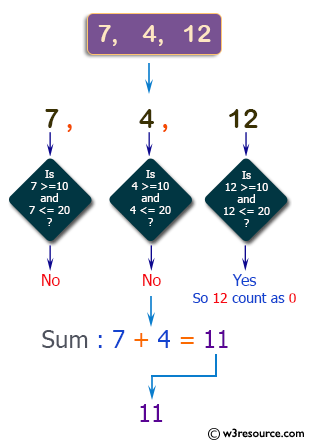C++ Exercises: Compute the sum of the three given integers
Sum with 10–20 Treated as Zero Except 13/17
Write a C++ program to compute the sum of the three given integers. Except for 13 and 17, any value in the range 10..20 inclusive counts as 0.
Sample Solution:
C++ Code :
#include <iostream>
using namespace std;
// Class Solution contains a function to manipulate numbers
class Solution
{
public:
// Function 'test' takes three integers (x, y, z) as parameters
int test(int x, int y, int z)
{
return fix_num(x) + fix_num(y) + fix_num(z); // Returns the sum after applying fix_num to each number
}
// Function 'fix_num' takes an integer 'n' as a parameter and processes it
int fix_num(int n)
{
// Checks if 'n' falls within certain ranges and replaces it with 0 if it does
return (n < 13 && n > 9) || (n > 17 && n < 21) ? 0 : n;
}
};
int main()
{
// Creating an instance of the Solution class
Solution *solution = new Solution();
// Testing the 'test' function with different sets of numbers
cout << solution->test(4, 5, 7) << endl;
cout << solution->test(7, 4, 12) << endl;
cout << solution->test(10, 13, 12) << endl;
cout << solution->test(17, 12, 18) << endl;
return 0;
}
Sample Output:
16 11 13 17
Visual Presentation:

Flowchart:

For more Practice: Solve these Related Problems:
- Write a C++ program to sum three integers, treating any value in the range 10–20 as 0 except when the value is 13 or 17.
- Write a C++ program that reads three numbers and replaces any value between 10 and 20 with 0 unless it is 13 or 17, then outputs the sum.
- Write a C++ program to compute the sum of three integers, setting values between 10 and 20 to zero with the exception of 13 and 17, and printing the result.
- Write a C++ program that accepts three numbers and calculates their sum after substituting 0 for any number in 10–20 (except 13/17) using conditional checks.
Go to:
PREV : Sum Ignoring 13 and Right Values.
NEXT : Nearest to 13 Without Crossing Over.
C++ Code Editor:
Contribute your code and comments through Disqus.
What is the difficulty level of this exercise?
